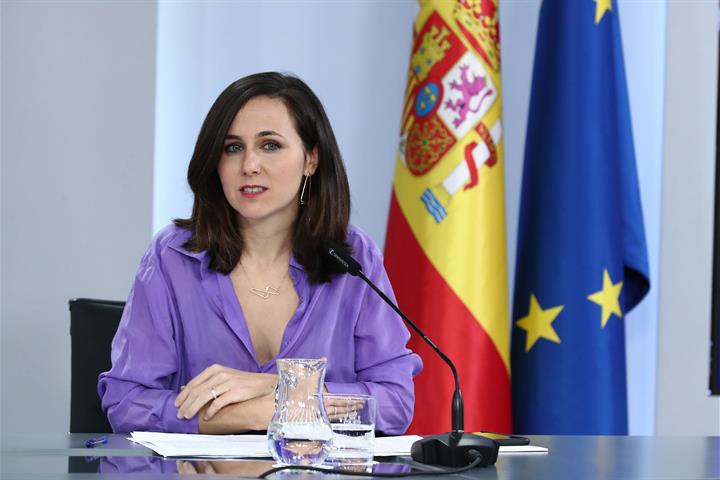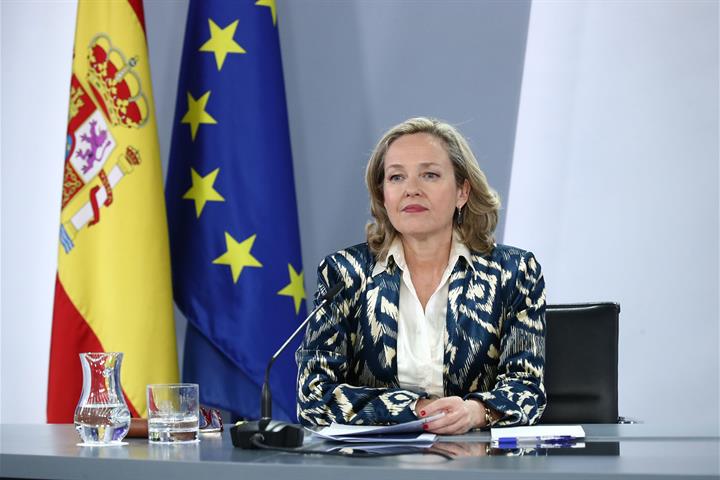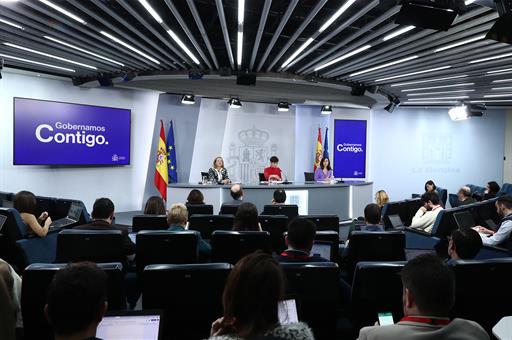Council of Ministers
The Government of Spain requires the Castile and León Regional Government to cease all actions against women's rights
Council of Ministers - 2023.1.17
Mon, Madrid
The Executive has approved an agreement putting an injunction on the competence of the Castile and León Regional Government in relation to any action that violates or undermines the Organic Law on sexual and reproductive health and the voluntary termination of pregnancy or Royal Decree 825/2010 that partially develops this law.
The Government Spokesperson and Minister for Territorial Policy, Isabel Rodríguez, has reiterated that doctors cannot be obliged to offer tests to women who have decided to terminate their pregnancies, nor can they be given instructions, suggestions or recommendations in this respect. Women's freedom over motherhood and self-determination has been clearly positioned by the Constitutional Court in its jurisprudence, she added.
She affirmed that the Government of Spain will not allow "the situation to move even a millimetre backwards in terms of women's rights" and will use "all the mechanisms at its disposal, all the legal tools, to protect women".
On the other hand, the Regional Governments cannot establish additional requirements to those derived from Spanish State regulations, so the Executive is also taking action to defend the competences of the Spanish State, the Spokesperson explained.
The Regional Government has one month to respond. The injunction is the step prior to a conflict of competences being filed before the Constitutional Court.
Draft Bill for the Law on Social Services
 The Minister for Social Rights and the 2030 Agenda, Ione Belarra, during her speech at the press conference after the Council of Ministers | Pool Moncloa/Fernando Calvo
The Minister for Social Rights and the 2030 Agenda, Ione Belarra, during her speech at the press conference after the Council of Ministers | Pool Moncloa/Fernando Calvo
The Council of Ministers has presented the draft bill for the Law on Social Services, which defines these as essential services and establishes the obligatory nature of a common catalogue for all the Regional Governments.
The Minister for Social Rights and 2030 Agenda, Ione Belarra, emphasised that "this first law on social services in the history of Spain" will contribute to strengthening these services as a fundamental pillar of the welfare state.
Belarra expressed that the regulation will also be "a lifeline" for a sector that has been suffocated by cuts and being assigned competences and functions that do not correspond to them or the professionals in this field, "who have all too often covered a service with their vocation that should have been better guaranteed by the public administration, at the cost of their labour rights".
With regard to service users, the law stresses that the system must be based on respect for people's rights and changes the exclusively welfare model in preference for a community, preventive approach, aimed at preventing people from falling into a situation of vulnerability that makes intervention more difficult.
The draft bill, which will now be submitted for public information, is part of the reforms envisaged in the Recovery, Transformation and Resilience Plan. Ione Belarra stressed that the new law will make it possible to deepen and make permanent the modernisation of social services, which has already begun with an investment of 875 million euros from European funds.
Common catalogue of social services
The regulation stipulates that the Territorial Council of Social Services and the System for Autonomy and Care for Dependency will design a common catalogue of social benefits and services to guarantee equality for citizens throughout the territory, as currently, Belarra said, "there are significant differences in the different autonomous communities". This catalogue will be very detailed and should include, among other things, ratios of professionals, minimum levels of provision or user satisfaction indicators.
Belarra explained that the census registration requirement will not be compulsory to access the social services in the catalogue and that, likewise, when a person moves to another autonomous community, either temporarily or permanently, they will be able to retain the services and benefits they received in their previous place of residence without the need to repeat the assessment process.
A new common information system that is interoperable with the regional systems will allow for more in-depth knowledge of the situations that social services deal with and, therefore, enable better policies and interventions to be designed, the Minister continued.
Another new measure will be the creation of a Single Social History for each social services user, which will contain the documentation relating to their case and which they will be able to access at any time. Each user will also have a professional person in charge of coordinating all interventions, who will be their reference point of contact.
Finally, specific regulations will be developed to ensure that emergency or urgent social aid is provided quickly: "If the needs are urgent, the aid must be urgent too," Belarra proclaimed.
The Government of Spain extends DTT broadcasts until 2024
 The First Vice-President of the Government of Spain and Minister for the Economy and Digital Transformation, Nadia Calviño, during her speech at the press conference after the Council of Ministers | Pool Moncloa/Fernando Calvo
The First Vice-President of the Government of Spain and Minister for the Economy and Digital Transformation, Nadia Calviño, during her speech at the press conference after the Council of Ministers | Pool Moncloa/Fernando Calvo
The Government of Spain has approved the regulatory changes that will allow the continuation of low-definition Digital Terrestrial Television (DTT) programmes until February 2024.
The First Vice-President of the Government of Spain and Minister for the Economy and Digital Transformation, Nadia Calviño, explained that the extension of the deadline responds to the situation caused by the pandemic, which has slowed down the renewal of the fleet of television sets adapted for high-definition DTT broadcasts.
She added that the measure will avoid "certain citizens being deprived of a digital terrestrial television service or having to bear the cost of acquiring new high-definition television equipment".
The Executive has also modified the use of the public radio domain to reorganise the 26 GH range, which is a priority for deploying 5G technology.
Calviño has indicated that the change will allow part of this range to be used for private networks on a self-provisioning basis, which will favour the deployment of the technology in ports, industrial parks, shipyards and car factories.
National Statistical Plan 2021-2024
The Council of Ministers has approved the Annual Programme 2023 for the National Statistical Plan 2021-2024.
Nadia Calviño has announced that the number of official statistics will increase and improvements will be made to encourage the use of new sources of information, such as large databases. In addition, the programme will reduce the workload of informants, incorporate a gender, disability or age perspective into statistics and promote the use of new technologies.
Agreement for the Seville Metro
 The Government Spokesperson and Minister for Territorial Policy, Isabel Rodríguez, during her speech at the press conference after the Council of Ministers | Pool Moncloa/Fernando Calvo
The Government Spokesperson and Minister for Territorial Policy, Isabel Rodríguez, during her speech at the press conference after the Council of Ministers | Pool Moncloa/Fernando Calvo
The Government of Spain has authorised the agreement between the Ministry of Transport, Mobility and Urban Agenda and the Regional Government of Andalusia to to finance line 3 of the Seville Metro. The infrastructure is valued at 1.3012 billion euros and each administration will contribute 50%.
Isabel Rodríguez insisted on the Executive's commitment to sustainable mobility and quality public transport, and recalled that it has already invested over 1.5 billion euros from European recovery funds in municipal initiatives throughout the territory.
Rodríguez also pointed out that the signing of agreements like this one is a consequence of the Government of Spain's interest in collaborating and cooperating with other public administrations. In 2021 alone, over 3,000 agreements were signed, compared to only 78 in 2017.
"This is a sufficiently significant figure", concluded the Minister, who took this information from the report issued by the Ministry of the Treasury and Public Function on collaboration agreements and instruments, which was analysed by the Council of Ministers.
Solid economic foundations for 2023
 The First Vice-President of the Government of Spain and Minister for the Economy and Digital Transformation, Nadia Calviño, during her speech at the press conference after the Council of Ministers | Pool Moncloa/Fernando Calvo
The First Vice-President of the Government of Spain and Minister for the Economy and Digital Transformation, Nadia Calviño, during her speech at the press conference after the Council of Ministers | Pool Moncloa/Fernando Calvo
During her speech at the press conference following the Council of Ministers, Nadia Calviño presented a report on the economic situation in Spain and the outlook for this year, which the Government of Spain "is tackling on a solid footing and with confidence".
Eurozone finance ministers held their first meeting of the year yesterday, at which they noted that the European economy fared better than expected during 2022. The Vice-President stressed that "labour markets remain buoyant, the inflation peak in the Eurozone is behind us and core inflation is expected to peak in the first quarter of the year".
In this context, the Spanish economy recorded strong growth, with Gross Domestic Product (GDP) increasing by over 5%, higher than the most optimistic forecasts. This growth is well above the European average and, according to Calviño, demonstrates the wisdom of the economic policy that the Government of Spain has been deploying since 2018.
In her opinion, the new economic cycle initiated after the pandemic is marked by the successful European response to the pandemic, the successful Spanish response to the impact of the war in Ukraine and the modernising boost from the Recovery, Transformation and Resilience Plan.
The Vice-President of the Government stressed the "extraordinary performance of the labour market". The number of national insurance contributors is at an all-time high and the stability and quality of employment is improving. Over the past year, there have been over two million more workers with permanent contracts, employment has increased in sectors with a future and high added value, and the percentage of unemployed under 25 years of age has been reduced.
In Calviño's opinion, these figures demonstrate the positive impact of the labour reform and the Executive's set of structural reforms as well as its clear commitment to science, innovation, vocational training and education.
Positive labour market developments are also increasing tax and social security revenues, thereby strengthening the public pension system and increasing investments in human capital and productivity, which are the keys to sustained long-term economic growth.
On the other hand, Nadia Calviño highlighted that the competitiveness of the Spanish economy is evolving better than that of its main European competitors. The tourism sector is approaching the turnover levels seen in 2019, a record year, and employment in this field is already above pre-pandemic levels.
Foreign direct investment increased by 55% compared to the same period in the previous year, which "is a clear sign of the business climate in Spain that is favourable for attracting talent and investment", added the Vice-President of the Government. On this point, she referred to the announcements of investment in Spain by large multinationals, especially in the fields of renewable energies, automotive manufacturing and new technologies.
Nadia Calviño also pointed out that inflation, the main challenge for economic policy, has fallen five points in five months, as a result of the drop in energy costs and the measures adopted by the Government of Spain.
"We start 2023 on a more solid footing thanks to the strength and resilience of economic activity, employment, exports, the good performance of tax revenues recorded in 2021 and 2022 and the significant, important impact of the recovery plan, which will rightly reach its maximum impact on the Spanish economy in the period 2023-2025", the Vice-President of the Government summarised.
Calviño anticipated that the Government of Spain will continue to meet the deficit and public debt reduction targets in 2023 and to deploy its policy for promoting the green and digital transition with a forward-looking perspective, implementing the investments and reforms from the recovery plan.
Non official translation





